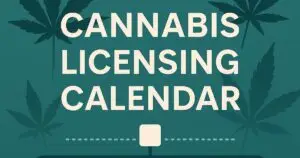 Use this calendar to monitor cannabis licensing opportunities across New York, Missouri, Illinois and Ohio. We summarize what’s open now, what’s paused, and what’s coming next – plus links to regulators and siting tools. If you need hands‑on support preparing or submitting an application, book a licensing consult.
Use this calendar to monitor cannabis licensing opportunities across New York, Missouri, Illinois and Ohio. We summarize what’s open now, what’s paused, and what’s coming next – plus links to regulators and siting tools. If you need hands‑on support preparing or submitting an application, book a licensing consult.
What’s Open Now
New York: New York’s Office of Cannabis Management hosts the Legal Online Cannabis Activities Locator (LOCAL) map, which helps you evaluate retail locations, check municipal opt‑out statuses and see active and pending licenses. The map includes a proximity report feature so provisionally licensed applicants can assess address viability when completing their applications.
Missouri: The Missouri Division of Cannabis Regulation (DCR) has completed its second microbusiness licensing round and issued 57 microbusiness licenses. Applicants must use the DCR Location Tool to determine congressional districts and GPS coordinates for proposed facilities. A third round of microbusiness licenses (48 statewide) is expected in 2025; time periods will be announced on the DCR website.
Illinois: The Illinois Department of Financial and Professional Regulation (IDFPR) oversees adult‑use dispensary licensing. No new retail application windows are open as of September 2025; monitor the IDFPR Adult Use Cannabis Program page for updates.
Ohio: The Ohio Division of Cannabis Control (DCC) is issuing dual‑use licenses to existing medical operators pursuant to the voter‑approved statute. Current medical cultivators, processors and dispensaries may apply for dual‑use or “10(B)” dispensary licenses. The DCC measures a one‑mile buffer between dispensaries and a 500‑foot prohibition from prohibited facilities. In June 2025 the DCC doubled the daily purchase limit for non‑medical customers, permitting dispensaries to sell up to 2.5 ounces of dried flower (or 15,000 mg THC in other products) per customer per day.
On the Watch‑List
Keep an eye on the following developments:
- New York: Additional adult‑use license windows (delivery, nursery and on‑site consumption) are expected once final regulations are adopted. Ongoing litigation and the Variscite ruling may alter prioritization frameworks.
- Missouri: The third microbusiness application window will award another 48 licenses statewide in 2025. Prepare early by confirming eligibility and securing site control.
- Illinois: A new licensing round could open after 2026 as provisional licenses expire and regulators evaluate market performance. Follow IDFPR announcements.
- Ohio: The DCC is developing rules for new adult‑use cultivator and dispensary licenses. Proposed rules indicate up to 50 additional adult‑use dispensary licenses may be issued in a future application round.
Siting & Proximity
New York: Use the LOCAL map to confirm that your proposed premises is not within the proximity buffers. Applicants must send a municipal notice at least 30 days (but no more than 270 days) before filing an application with OCM. Notice must be delivered by certified mail, overnight delivery service with proof of mailing, or personal service to the clerk or community board.
Missouri: Before applying for a microbusiness license, enter your proposed address into the DCR Location Tool to confirm the congressional district and capture the GPS coordinates. District selection determines your eligibility and competitive lottery pool.
Ohio: The DCC reviews sites for compliance with a one‑mile buffer between dispensaries and a 500‑foot separation from prohibited facilities. Applicants for “10(B)” dispensary licenses must demonstrate site control and meet local zoning requirements.
Eligibility Snapshots
New York: Adult‑use retail and microbusiness applicants must meet capital and compliance requirements set by OCM. Social and economic equity applicants may receive priority.
Missouri: Microbusiness licenses are reserved for individuals and entities meeting one of the eligibility criteria in Article XIV, Section 2, such as income thresholds or prior criminal justice involvement. An entity may hold only one microbusiness license and cannot own other marijuana licenses.
Illinois: Dispensing organization applicants must be at least 21 years old, maintain Illinois residency requirements and satisfy social equity provisions. The IDFPR uses lotteries and scoring systems when application windows open.
Ohio: Dual‑use applicants must hold an existing medical license. Future adult‑use licensees will need to meet capital, security and compliance standards established in forthcoming rules.
Need Help?
Licensing is competitive and time‑sensitive. Our team guides applicants through site selection, entity structuring, application drafting and compliance planning. Book a licensing consultation today.
FAQs
- How often is this page updated?
- We monitor regulatory announcements and court decisions. Significant changes to licensing windows, rules or itigation will be added as soon as practicable, with an “Updated on” date at the top of the page.
- Where can I verify the status of a licensing window?
- Always confirm with the state regulator’s official website and publications. For example, New York applicants should check the OCM licensing page and LOCAL map; Missouri applicants should monitor health.mo.gov; Illinois applicants should review the IDFPR Adult Use Cannabis Program; and Ohio applicants should consult the DCC.
- Do social equity provisions still apply?
- Yes. All four states incorporate social equity into their licensing schemes, though the criteria differ. Applicants should review the statutory criteria and prepare supporting documentation.


